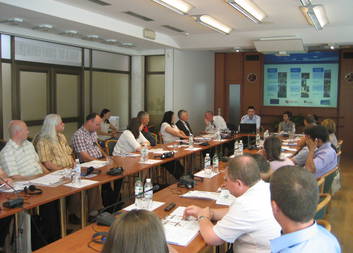On 30 June 2014, a closing conference of a Caritas Czech Republic project took place in Chișinău, Moldova. The project was aimed at kick-starting business activities – creating work opportunities using so-called remittances, i.e. money that Moldovans earn abroad and send or carry back to their country.
How does it feel when you want to establish something, for example a family business, but you cannot do it because of unfortunate circumstances? It is surely frustrating. The people in Moldova often face such a complicated situation.
As it is difficult to find work in their neighbourhoods, the majority of Moldovans have to consider the possibility of leaving their families to try their luck abroad. Roughly 40% of Moldovans fit for work decide to do so.
Caritas Czech Republic in collaboration with the non-profit organisation called ProRuralInvest and the institutional and bureaucratic support in the North, South and Central regions of the country contribute to finding a solution to this structural problem, which has become a priority of the local government. The Moldovan Government would like to stop the departure of its work force abroad and create sustainable economic growth within the country.
 As part of the Moldovan project, people interested in establishing their own businesses were trained in needed fields, e.g. creation of a business plan or bookkeeping. They also received assistance in registering for of business activities.
As part of the Moldovan project, people interested in establishing their own businesses were trained in needed fields, e.g. creation of a business plan or bookkeeping. They also received assistance in registering for of business activities.
In total, 1,185 people have received support, 171 of which (compared to planned 150) received individual support with establishing a business. Today, 159 companies are fully functional and 487 new working places have been created. The companies are dedicated to various fields, for example breeding cattle (beef cattle, pigs, sheep), rabbits, quail or bees; growing fruits (apples, pears, plums) and vegetables (tomatoes, peas); producing vegetable oil, furniture, briquettes, PVC or clothes; milling, car repair, hairdressing, baked goods; groceries, cosmetics or jewels and bijouterie. Overall, 1,185 people who returned as migrants or who received financial means from relatives staying abroad established small companies directly in Moldova owing to the knowledge gained during training sessions in the field of management and business planning – training that took place during the project.
The final conference was attended by 63 representatives of various organizations, institutions and by new entrepreneurs themselves. During the conference, the director of the partner organization, Viorel Gherciu, and coordinators for individual regions (Elena Anghel, Larisa Anghel and Ion Mihaila) presented the results of the project. Martina Kratochvílová, a deputy of Caritas Czech Republic and coordinator of Moldovan projects, talked about intended goals of the project and their achievements. Diana Cheianu-Adrei, from the SocioPolis organization, presented results of the project evaluation. Representatives of the Embassy of the Czech Republic in Moldova and the International Organization for Migration (IOM) also took part in the conference. Moldovan media were present as well, including the state television “Moldova 1”.
At the end of the conference, the chief of the economics department of local authorities in Straseni, Nicolae Sirbu, pointed out the significance of projects similar to the present one (that was financed by the European Commission and Czech Development Agency). He promised that local authorities in Straseni will follow the project results and further develop conditions for running business in rural regions of Moldova.







